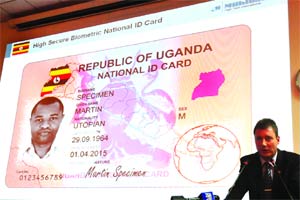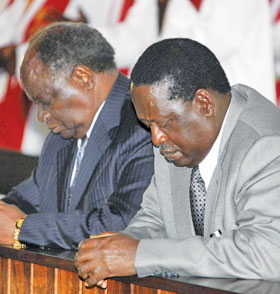Folks,
We are getting somewhere. Keep on Praying and lighten your hopes high.
We know they are more than six, but, yes, we have six on hand. Good News.
Cheers !
Judy Miriga
Diaspora Spokesperson
Executive Director
Confederation Council Foundation for Africa Inc.,
USA
http://socioeconomicforum50.blogspot.com
– – – – – – – – – – –
Six to be tried at The Hague
In Summary
The individuals will be those who bear most of the blame for chaos, says Ocampo
Six key architects of Kenya’s post-election chaos will be prosecuted at The Hague, International Crimes Court chief prosecutor Luis Moreno-Ocampo told a government team on Monday.
However, Mr Moreno-Ocampo is said to have declined to name the individuals during a meeting with a Cabinet committee set up to facilitate ICC investigations.
Sources at the two-hour meeting at Harambee House said the prosecutor laid his investigations plans before the committee chaired by Internal Security minister George Saitoti.
He is said to have stated that other key players in the chaos should be handled at the International Criminal Tribunal in Arusha.
Investigations
“He told us that he will eventually take six individuals to face charges at The Hague. But he refused to disclose any names to us,” said a source close to the talks.
The names, he told the meeting, would be an outcome of the investigations he has launched and not necessarily those mentioned in the Waki Commission and the Kenya National Commission on Human Rights (KNCHR) reports.
The prosecutor is said to have hinted that he will register two cases involving the six individuals at The Hague either in September or October.
Members of the government team at the talks were ministers Saitoti, James Orengo, Moses Wetang’ula and Attorney-General Amos Wako.
The team – which also includes ministers Mutula Kilonzo and Amason Jeffah Kingi – was formed by President Kibaki and Prime Minister Raila Odinga to deal with all issues relating to the ICC.
Speaking after the meeting, Prof Saitoti said: “We have had a cordial meeting and the government will cooperate with the ICC investigations.”
Mr Moreno-Ocampo was meeting the government team for the first time since he arrived on Saturday to start investigations into the post-election violence that followed the disputed December 2007 presidential election results.
At least 1,133 people were killed and another 650,000 displaced from their farms. The prosecutor has said those on the list include leaders from PNU and ODM, business people and civil servants who were closely linked with the politicians.
Mr Moreno-Ocampo arrived at Harambee House at 3pm from the Serena Hotel, where he had attended a meeting with Postmaster-General Hussein Ali and Administration Police Commandant Kinuthia Mbugua. Mr Ali was police commissioner during the chaos.
Meanwhile, 25 civil society groups are to meet Mr Moreno-Ocampo in Nairobi today to give their account of the poll chaos.
“Most of these groups have been working with victims and witnesses of the chaos at grassroots level,” said Mr Ken Wafula, executive director of the Eldoret-based Centre for Human Rights and Democracy.
– Additional reporting by Barnabas Bii
– – – – – – – – – – –
Ocampo in quiet talks with victims
By PETER LEFTIE
International Criminal Court chief prosecutor Luis Moreno-Ocampo met victims and potential witnesses of the post-election violence shortly after flying into Kenya on Saturday.
Mr Moreno-Ocampo heard first-hand harrowing tales of those who lost loved ones, suffered injuries, lost property and were run out of their homes by marauding gangs at the height of the violence that rocked the country in the aftermath of the disputed 2007 election.
Safety of victims
The meeting with about 30 people was kept out of the glare of the media to ensure the safety of the victims. A source present at the Sportsview Hotel, Kasarani, said Mr Moreno-Ocampo “spent a considerable amount of time with the victims listening to their ordeals, posing questions to them and also responding to their queries. Many of them wanted to know whether justice will ever be delivered”.
The prosecutor later declared that he expected to finalise investigations and ask for warrants of arrest against key suspects within six or seven months. A source familiar with Mr Moreno-Ocampo’s itinerary, but who cannot be named because of the sensitive nature of the investigations, said the prosecutor met the victims hours after jetting into the country.
He intends to nail those who bear the greatest responsibility for the violence that claimed 1,133 people. Among those who met Mr Moreno-Ocampo was Mr Bernard Orinda Ndege, whose two wives and nine children were killed at his Naivasha home.
The victims, drawn from various parts of the country which bore the brunt of the violence, were brought to Nairobi by human rights groups that have been offering support and protecting likely witnesses.
Protect witnesses
The prosecutor repeated calls for the government to protect witnesses at a press conference which he convened on arrival in Nairobi on Saturday morning. He has also offered an audience to people who feared they may be in the still secret list of 20 top suspects he handed over to the ICC judges when the go-ahead was given for investigations.
So far it is not known if any prominent Kenyans had taken up the offer to meet Mr Moreno-Ocampo. But speaking separately, several politicians adversely mentioned in the Kenya National Commission on Human Rights (KNCHR) report on the violence said they had no intention of meeting the prosecutor because that might be taken as an admission of guilt.
Mt Elgon MP Fred Kapondi, Uasin Gishu politician Jackson Kibor, former MPs Jayne Kihara and David Manyara said they would not meet Mr Moreno-Ocampo unless formally asked to do so. However, Nyatike MP Edick Anyanga and his Migori counterpart John Pesa said they were willing to meet the prosecutor to clear their names.
The ICC prosecutor says he is determined to seek the court’s authority to try between four and six suspects by the end of the year. Separately, Energy minister Kiraitu Murungi said it was impossible to stop the ICC prosecutor from conducting investigations into the violence.
Reacting to reports that the PNU wing of the coalition government had attempted to block Mr Moreno-Ocampo’s Kenya mission, Mr Murungi stated: “The moment we failed to set up a local tribunal, we subjected ourselves to ICC; it is too late to stop him now”.
On Sunday, the Nation reported how bitter differences between ODM and PNU derailed attempts by the government to stop Mr Moreno-Ocampo from visiting the country. A letter by Lands minister James Orengo to the chairman of a Cabinet committee dealing with the ICC matter, Internal Security and Provincial Administration minister George Saitoti, forced the government to drop attempts to block the visit.
The May 6 letter copied to Justice minister Mutula Kilonzo, East African Cooperation minister Amason Kingi and Attorney General Amos Wako, warned that Prime Minister Raila Odinga’s ODM would reject any move to derail the investigation that was not sanctioned by the full Cabinet.
At the same time, Mr Moreno-Ocampo has assured suspects of the post-election violence of impartiality. Speaking when he met civil society groups, victims and general public at the National Museums on Sunday Mr Moreno-Ocampo sought to allay fears that particular communities were targeted by the investigations.
“We shall not be suspect-driven but crime-driven in the investigations,” he assured the country. There has been reported unease in the Rift Valley where most of the atrocities took place. Fear has gripped the province following reports that perpetrators of the violence, including prominent politicians and businesspeople, would be handed over to the court in The Hague.
Mr Moreno-Ocampo said he would follow the law in his investigations without prejudice, emphasising that he would go for five or six suspects who bore the greatest responsibility. “We shall be impartial, 100 per cent impartial. This is the law, we have to follow it,” he said.
He added that the names of the suspects would only be disclosed once he has gathered sufficient evidence. He will also meet with the suspects prior to presenting the evidence, he added. Investigations would also take place in confidence, he added.
Additional reporting by Walter Menya












